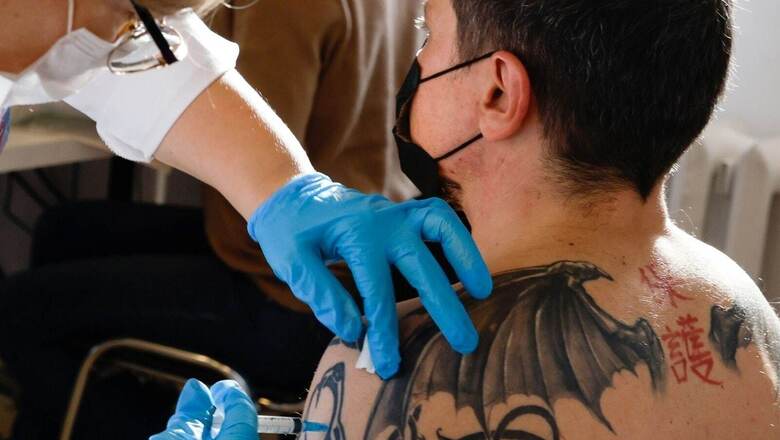
views
Nearly two years into a global health crisis that has killed more than 5 million people, infections are again sweeping across parts of Western Europe, a region with relatively high vaccination rates and good health care systems but where lockdown measures are largely a thing of the past.
The World Health Organization said coronavirus deaths rose by 10% in Europe in the past week, and an agency official declared last week that the continent was “back at the epicenter of the pandemic.” Much of that is being driven by spiraling outbreaks in Russia and Eastern Europe — where vaccination rates tend to be low — but countries in the west such as Germany and Britain recorded some of the highest new case tolls in the world.
While nations in Western Europe all have vaccination rates over 60% — and some like Portugal and Spain are much higher — that still leaves a significant portion of their populations without protection.
Dr. Bharat Pankhania, senior clinical lecturer at Exeter University College of Medicine and Health told the Associated Press that the large number of unvaccinated people combined with a widespread post-lockdown resumption of socializing and a slight decline in immunity for people who got their shots months ago is driving up the pace of infections. The question now is if countries can tamp down this latest upswing without resorting to stringent shutdowns that devastated economies, disrupted education and weighed on mental health. Experts say probably — but authorities can’t avoid all restrictions and must boost vaccination rates.
Low Vaccination Rates in Western Europe
Germany’s vaccination rate is far better than that of many central and eastern European countries, where the death toll from coronavirus is soaring. In Romania, for example, only about 4 in 10 people have had two shots, and coronavirus deaths have hit record levels.
Still, with about 1 in 3 Germans not yet fully vaccinated, the German vaccination rate is among the lowest in Western Europe. In Belgium, Denmark and Italy, 3 in 4 people are fully vaccinated. In Spain and Iceland, only about 2 in 10 have yet to get the second shot. Portugal has a vaccination rate of close to 90%.
The German rate lags because of pockets of vaccine resistance that are not limited to but are especially deep in the former Communist east, where the far-right Alternative for Germany party is strong. Tino Chrupalla and Alice Weidel, leaders of the AfD’s parliamentary group, are both proudly unvaccinated — and both tested positive for the virus in recent weeks.
“What we are experiencing is above all a pandemic of the unvaccinated,” the minister of health, Jens Spahn, said this month.
German lawmakers are mulling legislation that would pave the way for new measures. Austrian Chancellor Alexander Schallenberg announced Friday that unvaccinated people in two regions will only be able to leave home for specified reasons starting Monday, and he is considering implementing similar measures nationwide. But he has said he doesn’t want to impose the restrictions on those who got the shot.
Austria is seeing one of the most serious outbreaks in Western Europe, along with Germany, which has reported a string of record-high infections in recent days. “We have a real emergency situation right now,” said Christian Drosten, the head of virology at Berlin’s Charite Hospital, which has started canceling scheduled surgeries. Duesseldorf’s university hospital said earlier this week that its ICU is full, though many facilities are struggling more with staff shortages than bed space.
Drosten said Germany must increase its vaccination rate of 67% further — and fast. But officials have balked at ordering vaccine mandates and want to avoid any blanket lockdowns.
In Austria, the government is likely to decide on Sunday to impose a lockdown on people who are not fully vaccinated against the coronavirus as daily infections have surged to record levels, Chancellor Alexander Schallenberg said on Friday.
Roughly 65% of Austria’s population is fully vaccinated against COVID-19, one of the lowest rates in Western Europe. Many Austrians are sceptical about vaccines, a view encouraged by the far-right Freedom Party, the third-biggest in parliament.
In Russia’s Despair-filled ICUs, Vaccine Hesitancy a Marker
Russia’s low 35% vaccine rate has propelled one of the most devastating Covid-19 scenarios in the country. With only about a third of Russia’s 146 million people vaccinated against COVID-19, the country has hovered near 1,000 reported deaths per day for weeks and surpassed it on October 21.
“The majority of ICU patients in grave condition are unvaccinated,” Dr. Georgy Arbolishvili from Moscow Hospital No.52 told The Associated Press. These illnesses “could have been very easily avoided if a person had been vaccinated.”
Even though vaccines are plentiful, Russians have shown hesitancy and skepticism when it comes to getting vaccinated, which has been blamed on conflicting signals sent by authorities since the pandemic began last year.
Even as ICUs have filled in recent weeks, life in Moscow has continued as usual, with restaurants and movie theaters brimming with people, crowds swarming nightclubs and karaoke bars and commuters widely ignoring mask mandates on public transportation.
Netherlands to Enter Into Lockdown Despite High Vaccine Rates
Approximately 85% of the adult Dutch population has been fully immunised against Covid-19. Booster shots have so far only been given to a small group of people with compromised immune systems, but they will be made available to people aged 80 and up in December, the SCMP reports.
According to data from the Netherlands’ Institute for Health (RIVM), approximately 55% of patients in Dutch hospitals and 70% of those in intensive care were unvaccinated or only partially vaccinated last month. The country has imposed a partial lockdown starting this weekend.
Spain a Shining Example
Spain, once one of Europe’s hardest hit nations, perhaps offers an example of how the risks can be managed.
It has vaccinated 80% of its population, and while face masks are no longer mandatory outdoors, many people still wear them. While infections have ticked up slightly recently, Rafael Bengoa, one of Spain’s leading public health experts, said that given the high vaccination rate, “the virus won’t be able to dominate us again.”
With inputs from the Associated Press, New York Times, and Reuters.
Read all the Latest News here



















Comments
0 comment